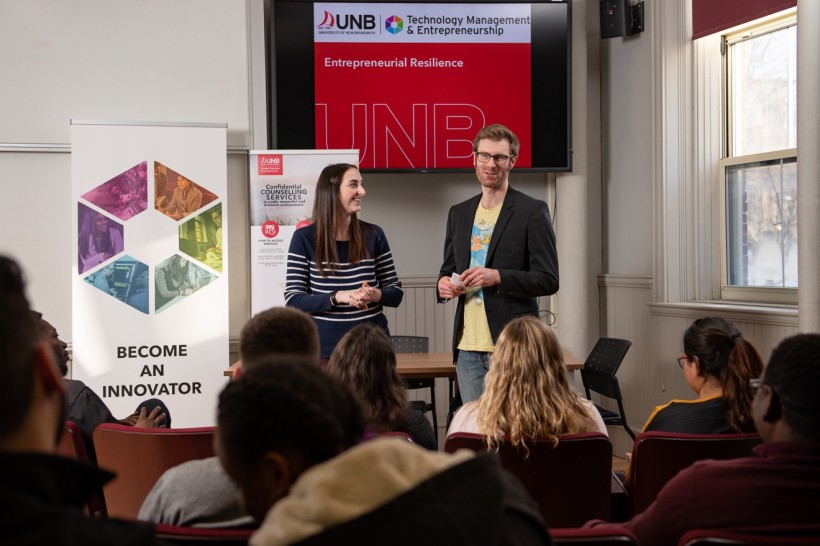A new course that helps entrepreneurs cope with the stresses of forming their own businesses has got off to a promising start at the University of New Brunswick.
Organizers hope that Entrepreneurial Resilience, which is a full-credit course, will help students avoid falling prey to common problems like sleeplessness, poor exercise and eating habits, and social withdrawal.
“Sleep is number one. It’s the first thing students give up,” Rachel Clarke, program coordinator at UNB’s Master of Technology, Management and Entrepreneurship program said in an interview.
She said students mistakenly think if they get one hour less of sleep, they’ll get one hour more of work.
“Founders are the foundations of their businesses but they have no recognition that without them being healthy their businesses can’t be healthy,” she said.
Entrepreneurship is stressful for many reasons. There are financial strains, work volume and the fact that cash-strapped founders have to fulfil many different roles. There’s a widespread bravado around facing the challenges head on.
“The #founder and #entrepreneur lifestyles on social media influence people to work crazy long hours,” Clarke said. “They feel they have to strong-arm their way through it.
“Students withdraw to focus on their startup or because they’ve hit a hurdle and withdraw to protect themselves from that hurt.”
Founders’ ventures become their entire world. “The business is so interlocked with their self they can’t separate it from the human being,” Clarke said.
The new UNB course teaches students tools to help prevent them slipping into these patterns.
Matthew MacLean, who is teaching on the course and is the mental health strategist in the university’s counselling department, said students are learning values and practices around self-care.
First, they have to be convinced of its importance.
“It’s a discussion-based interactive course,” MacLean said. “We put the ideas out there. They are all smart and logical people and they come to the conclusions themselves…We give them the map and they find their own way.”
Some of the information is less obvious: students learn about the impacts of different wavelengths of light and the physiological impact of colours. They learn they are designed to be awake when the sun is out.
MacLean said the federal government advises that every adult get at least 150 minutes of moderate exercise every week. The course advises founders also take 150 minutes to share their emotional world with someone they trust.
The issues around founder health are serious. Various studies, including by Halifax-based The Mindset Project, and a recent report called Going it Alone from the Canadian Mental Health Association supported by the Business Development Bank, reveal that entrepreneurs experience high levels of stress in both their business and personal lives.
Going it Alone said nearly 30 percent had experience with a mental health condition as opposed to 20 percent of the general population. More than half reported feelings of inadequacy. Around 66 percent reported difficulty in maintaining work-life balance.
Female founders reported more mental distress, as did those with businesses in the earlier ‘growth’ stage. Still, most entrepreneurs said they were happy with their mental health at least once a week. Fewer than one in five sought professional help. In fact, 78 percent said they did not want the support of a professional. More than one-third said stigma was a barrier to seeking support.
The study’s recommendations included making mental health part of entrepreneurship education.
Clarke said students in the course’s first 15-person cohort are responding well, and there are signs students are passing on what they have learned.
“For homework, student have to do a different act of self care each week,” Clarke said. “This pulls in friends who are not in the class. Those students ask, ‘How is this activity your homework?’ It creates a message about the importance of students taking care of themselves.”
UNB's accelerator programs for entrepreneurs, the Summer Institute and Energia, have each added new workshops based on the course, and organizers hope to see similar courses taking root in other institutions.










